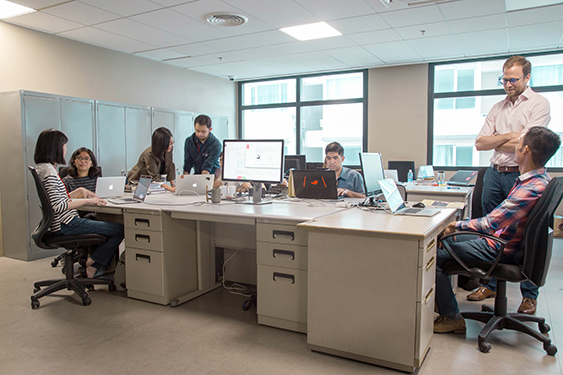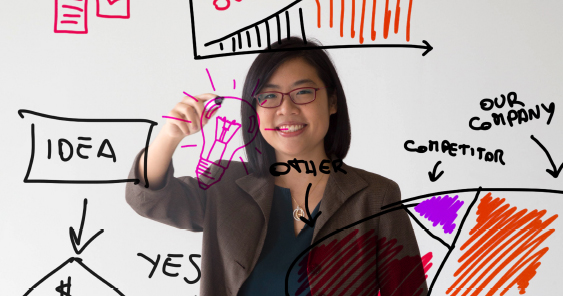Stephanie Sy, CEO of Thinking Machines. (Photos by Ara Conza)
Encountering the term “data science” can be pretty intimidating. A dissertation on the subject, entitled “What is Data Science? Fundamental Concepts and a Heuristic Example,” by Chikio Hayashi in Tokyo, Japan, defines it as a “concept to unify statistics, data analysis, machine learning and their related methods to understand and analyze actual phenomena.” From this definition, one might conclude data science is the domain of geeks, of cerebrally-gifted humans skilled in the nitty-gritty of technology. But, as this small company shows, that’s not the case at all.
Thinking Machines is a data consultancy company, with offices in San Francisco, California and Manila. It was built by Stephanie Sy in 2015 after a brief stint as data scientist for Google. She noticed the explosive growth of data science around the world but did not see the same trend in the Philippines. Today, Thinking Machines is one of the few companies in the country that offers services like collecting data, presenting collecting data through interactive visuals for easier analysis, building programs that predict user activity through analyzed data, and convincing companies to utilize data as a strategy for business success.

Thinking Machines welcomes a diverse roster of people from various studies, including software development, journalism, and sociology.
The company has worked for different organizations, agencies and departments, helping them solve issues through their services. One case study, released in April 2017, showed the choke points of EDSA, Manila’s main artery infamous for its heavy traffic. By coordinating with Waze for the collection of data and the Metro Manila Development Authority (MMDA) for presentation and analysis, Thinking Machines gathered information for a month to identify the areas along EDSA where vehicle speed became significantly low. They identified four key areas, and then checked the said areas through Google Earth to see what they look like. They found in these areas the following: a line of parked utility vans that occupy a third of the street, commuters occupying a third of the street to flag down vehicles, and available left turns that may have blocked traffic flow. They then presented this to MMDA for the latter to take further action.
Thinking Machines has also worked with Meralco to understand how people consume electricity. With this data, they made recommendations on how Meralco can balance their power, and logistics companies to develop faster systems in decision making, rather than having to go through a list of people before deciding anything.
Data science does not just invole one industry usually the tech sector. To be effective, data science must tap into various disciplines. For Sy, data science is a broad term for a long range of skillsets which go beyond computer science and technology. The members of Thinking Machines, for example, include a software developer who once worked for a Singaporean startup, and a broadcast journalist with eight years’ worth of experience. Sy also looks forward to having more people such as those with a background in sociology. Anyone is welcome as long as the passion for the importance of data as a solution to real-life problems is there.

A culture of teaching and learning, as well as having fun at work, is evident in the Thinking Machines office.
Thinking Machines fosters a culture of teaching and learning. Considering that data science is a fairly new industry in the Philippines, Sy allows her team to take risks and to learn from them. She aims for the company to move and innovate fast as a team and as a catalyst for data science practice in the country.
There is a lot to look forward to for Thinking Machines as a company and data science as an industry. With proper education and sustained hard work, it won’t be long until data science won’t just be technology jargon, but a proven solution to problems that plague society.
This article was published in the adobo magazine Trends 2018 issue.







